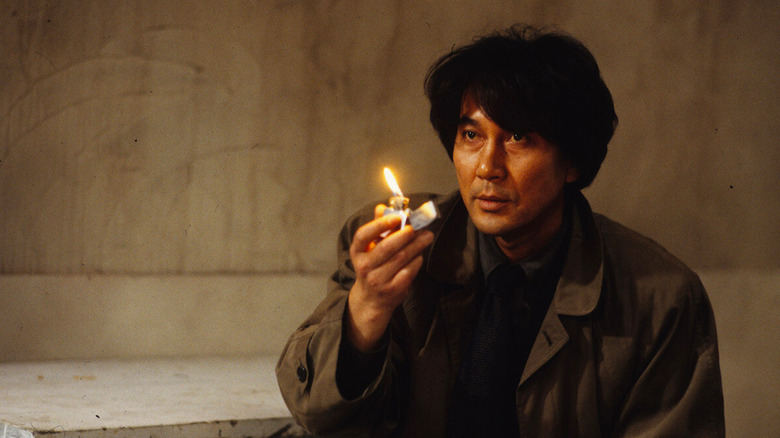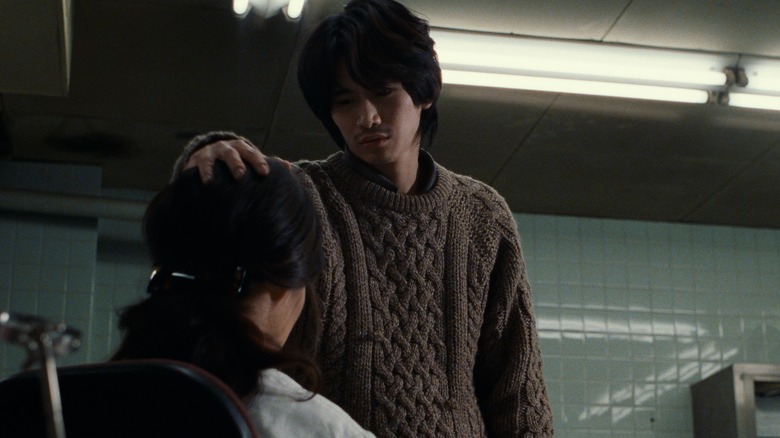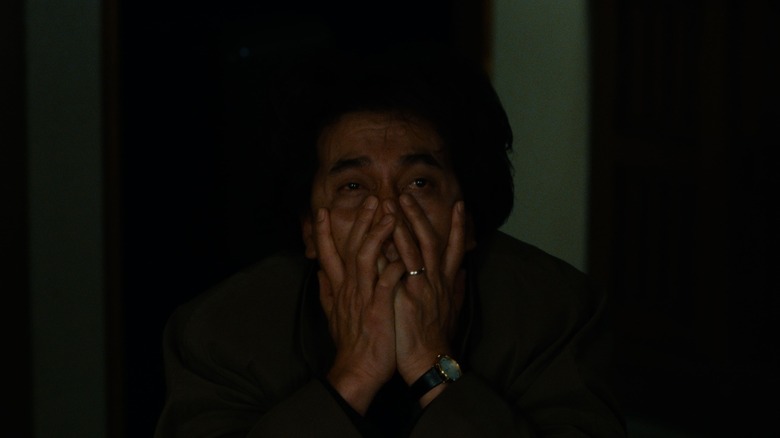The Daily Stream: Cure Will Give You The Creeps
(Welcome to The Daily Stream, an ongoing series in which the /Film team shares what they've been watching, why it's worth checking out, and where you can stream it.)
The Film: "Cure"
Where You Can Stream It: The Criterion Channel
The Pitch: Kenichi Takabe (Kōji Yakusho), an eerily calm police detective, is investigating a series of strange, seemingly connected murders. In each case, the victims were killed with a large X carved into their throats. But this isn't a whodunit. In each instance, the killer was caught – and it's been a different person every time. The killer never denies they've committed the crime; they confess while also saying they don't know why they did what they did. It just happened. That's weird enough on its own, then you throw in the fact that none of the killers knew each other, or of the other murders, and yet they have all been carrying out identical crimes.
As the detective digs deeper into the case and grows more and more perturbed, we also meet an extremely strange man, Mamiya (Masato Hagiwara). Mamiya wanders into people's lives, seeming to have no memory of who he is or where he came from. After he departs, however, the people he's just met often end up killing someone they know – carving X's into their victim's throats. Eventually, Takabe and Mamiya cross paths and the detective becomes convinced that the weird amnesiac is somehow behind the murders, compelling people to carry them out via some form of hypnosis. It sounds like a somewhat silly set-up, and yet in the hands of filmmaker Kiyoshi Kurosawa, "Cure" becomes one of the scariest films you'll ever see.
Why It's Essential Viewing
What makes "Cure" so scary? It's not the violence – although that is, indeed, disturbing, such as in a scene where a mesmerized killer indifferently peels a victim's face off. And there's nothing even close to a jump-scare in this movie. Instead, just as he did with the extraordinary "Pulse," filmmaker Kiyoshi Kurosawa conjures up horror with space and mood. The director often surrounds his actors with empty, dingy backdrops. Walls have a faded gray or brown color. Everything looks washed-out while seeming simultaneously unwashed. The mundane – a bathroom, an office, a hallway – suddenly becomes horrifying just through shadows and emptiness. There's loneliness trapped within all that empty space, and it radiates off the screen, drawing us in, enveloping us.
A foreboding atmosphere prevails through "Cure," so much so that nearly every scene has an almost dream-like quality. This is only strengthened as the story unfolds and characters begin to lose control of their own senses. And that's perhaps the scariest element of all here – the loss of control. "Cure" suggests that we can be forced to abandon reason; to give up on our very sanity and become cold-blooded killers, simply by the power of suggestion.
Masato Hagiwara's mysterious mesmerist is one of cinema's most chilling villains. A blank, soft-spoken figure who has no real motive other than his own sociopathic satisfaction. Every scene he occupies feels wrong, keeping us on edge as we await some terrible reveal. This is the stuff of great horror, and "Cure" is indeed one of the best horror movies ever made (so is "Pulse," and it's pretty damn amazing that one filmmaker made them both). The slow-burn nature won't appeal to those looking for cheap scares, but those in search of a smothering kind of dread that clings to you the way the smell of smoke lingers in your clothes will find true horrors here.
Martin Scorsese On Cure
Reader, I would hope that, by now, you've come to trust my suggestions. However, I also know I'm a total nobody, and you might not give two damns about what I have to say. That's fine! But if you won't listen to me, why not listen to Mr. Martin Scorsese? Pretty much no one knows more about movies than Scorsese, and he's an on-the-record fan of "Cure." Here's what he had to say:
This is one of the very best films by the extremely talented Kiyoshi Kurosawa— for those of you who don't know the name or the work, he's no relation to Akira Kurosawa. He's an absolute master of light, framing and pacing, and he has so much control over all three that there are moments in his movies when the slightest gesture in the corner of the frame will send a shiver down your spine. Kurosawa doesn't exactly work in the horror genre. Rather, his films are filled with a strange dread. In many of them, something has arrived, no one knows exactly what or how or for what purpose: Reality is untouched except for a small, unsettling detail or two, which mutates into violence and irrationality.
Kurosawa is a real student of cinema. Along with Shinji Aoyama, Makoto Shinozaki and a few other directors, he's the former pupil of the great Japanese critic and historian Shigehiko Hasumi. Each of them has absorbed the lessons of older American cinema and taken them to interesting and unusual places. Kurosawa, for instance, is a great admirer of Robert Aldrich, and if you didn't know it you'd never guess as much from simply looking at his movies. But it makes sense: They're both making movies about the world in a state of emergency, creating a troubling poetry of violence and upset. I can recommend every Kurosawa movie I've seen: Séance, Charisma, Doppelgänger, Bright Future and the more recent Retribution.
Along with Pulse, which is about ghosts on the Internet, Cure is his most terrifying movie. The excellent Kôji Yakusho (he and Kurosawa have worked together many times) is a detective confronted with a seemingly inexplicable phenomenon: a series of murders in which the perpetrators are standing by unaware of how or why they did it, with red X's carved on the necks of the victims. There are startling images and moments in this picture that will haunt you for a long time to come, and I suppose I should say that it's not for the faint of heart. But be brave, because it's worth it. Kurosawa is a major filmmaker.
There's a new 4K restoration of "Cure" on the way. But in the meantime, you can watch the pre-4K version on The Criterion Channel right now! And you should.


